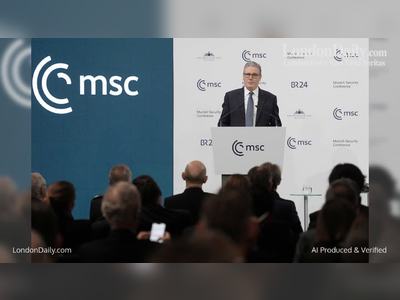
Where does the Taliban get its money and who's funding the militant group in Afghanistan?
Afghanistan, among poorest nations in the world, is heavily dependent on American aid
The Taliban, on the heels of a steady, monthslong military blitz, retook control of Afghanistan last week, just four months after President Biden announced he would withdraw U.S. troops from the embattled nation and nearly 20 years after the militant group was first ousted.
One of the biggest questions the Taliban has faced after sweeping so quickly into power is how it got the cash to seize control and govern the country.
Afghanistan, already one of the poorest countries in the world, is heavily dependent on American aid. About 80% of the nation's budget is funded by the U.S. and other international donors, according to John Sopko, the special inspector general for Afghanistan reconstruction.
Within days of the Taliban consolidating power in Kabul, the Treasury Department froze Afghan government reserves stored in U.S. banks, depriving the group of billions of dollars in aid.
But it's unclear how effective the Treasury's restrictions will ultimately be: The Taliban operates largely outside the confines of the global financial system.
"They're awash with cash," Gretchen Peters, executive director of the Center on Illicit Networks and Transnational Organized Crime, told NPR. "The Taliban has been earning far more from trafficking drugs and other illicit activity, ranging from extortion rackets to timber trafficking, artisanal mining, kidnapping schemes, for almost two decades now."
There are different factions of the Taliban: Some, in heavy drug-producing areas in the south and west of Afghanistan such as Kandahar and Helmand, are more dependent on the drug trade to finance their operation. But others, like the ones located in the east and southeast, tend to make their money in other ways, including extortion, kidnapping and timber trafficking, Peters said.
While it's difficult to know precisely how much money the Taliban brings in each year, a recent United Nations report estimated that it's somewhere between $300 million and $1.6 billion.
"The primary sources of Taliban financing remain criminal activities, including drug trafficking and opium poppy production, extortion, kidnapping for ransom, mineral exploitation and revenues from tax collection in areas under Taliban control or influence," the report said.
Hanif Sufizada, who studied the Taliban's finances as an economic policy analyst at the Center for Afghanistan Studies, projected the group got about $416 million from drugs – Afghanistan accounted for roughly 84% of global opium production over the past five years according to the United Nations – and about $400 million from the mining of iron ore, marble, copper, gold, zinc and other metals and rare-earth minerals.
The group imposes a 10% tax on every link in the drug production chain, according to a report from the Afghanistan Research and Evaluation Unit, an independent research organization in Kabul, including on the farmers who grow the poppy, the main ingredient in opium, the labs that convert it into a drug and the traders who move the final product out of the nation.
The militant group received another $160 million through extortion and taxes; $240 million from private donors and international institutions, many of which are located in Persian Gulf Countries; $240 million from everyday consumer exports that are used to launder illicit money, such as auto parts and reassembled vehicles; and $80 million from real estate.
It's unclear whether the U.S. plans to impose additional financial sanctions on Afghanistan to target the Taliban.
Asked Tuesday what actions the U.S. intends to take to ensure the safety of women in Afghanistan, White House national security adviser Jake Sullivan said, "There are obviously issues related to sanctions." He declined to elaborate further.
"I want to be able to have our team communicate directly to the Taliban both what the costs and disincentives are for certain types of action and what our expectations are," Sullivan said.
One of the biggest questions the Taliban has faced after sweeping so quickly into power is how it got the cash to seize control and govern the country.
Afghanistan, already one of the poorest countries in the world, is heavily dependent on American aid. About 80% of the nation's budget is funded by the U.S. and other international donors, according to John Sopko, the special inspector general for Afghanistan reconstruction.
Within days of the Taliban consolidating power in Kabul, the Treasury Department froze Afghan government reserves stored in U.S. banks, depriving the group of billions of dollars in aid.
But it's unclear how effective the Treasury's restrictions will ultimately be: The Taliban operates largely outside the confines of the global financial system.
"They're awash with cash," Gretchen Peters, executive director of the Center on Illicit Networks and Transnational Organized Crime, told NPR. "The Taliban has been earning far more from trafficking drugs and other illicit activity, ranging from extortion rackets to timber trafficking, artisanal mining, kidnapping schemes, for almost two decades now."
There are different factions of the Taliban: Some, in heavy drug-producing areas in the south and west of Afghanistan such as Kandahar and Helmand, are more dependent on the drug trade to finance their operation. But others, like the ones located in the east and southeast, tend to make their money in other ways, including extortion, kidnapping and timber trafficking, Peters said.
While it's difficult to know precisely how much money the Taliban brings in each year, a recent United Nations report estimated that it's somewhere between $300 million and $1.6 billion.
"The primary sources of Taliban financing remain criminal activities, including drug trafficking and opium poppy production, extortion, kidnapping for ransom, mineral exploitation and revenues from tax collection in areas under Taliban control or influence," the report said.
Hanif Sufizada, who studied the Taliban's finances as an economic policy analyst at the Center for Afghanistan Studies, projected the group got about $416 million from drugs – Afghanistan accounted for roughly 84% of global opium production over the past five years according to the United Nations – and about $400 million from the mining of iron ore, marble, copper, gold, zinc and other metals and rare-earth minerals.
The group imposes a 10% tax on every link in the drug production chain, according to a report from the Afghanistan Research and Evaluation Unit, an independent research organization in Kabul, including on the farmers who grow the poppy, the main ingredient in opium, the labs that convert it into a drug and the traders who move the final product out of the nation.
The militant group received another $160 million through extortion and taxes; $240 million from private donors and international institutions, many of which are located in Persian Gulf Countries; $240 million from everyday consumer exports that are used to launder illicit money, such as auto parts and reassembled vehicles; and $80 million from real estate.
It's unclear whether the U.S. plans to impose additional financial sanctions on Afghanistan to target the Taliban.
Asked Tuesday what actions the U.S. intends to take to ensure the safety of women in Afghanistan, White House national security adviser Jake Sullivan said, "There are obviously issues related to sanctions." He declined to elaborate further.
"I want to be able to have our team communicate directly to the Taliban both what the costs and disincentives are for certain types of action and what our expectations are," Sullivan said.











